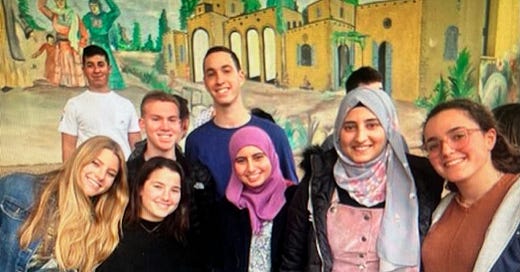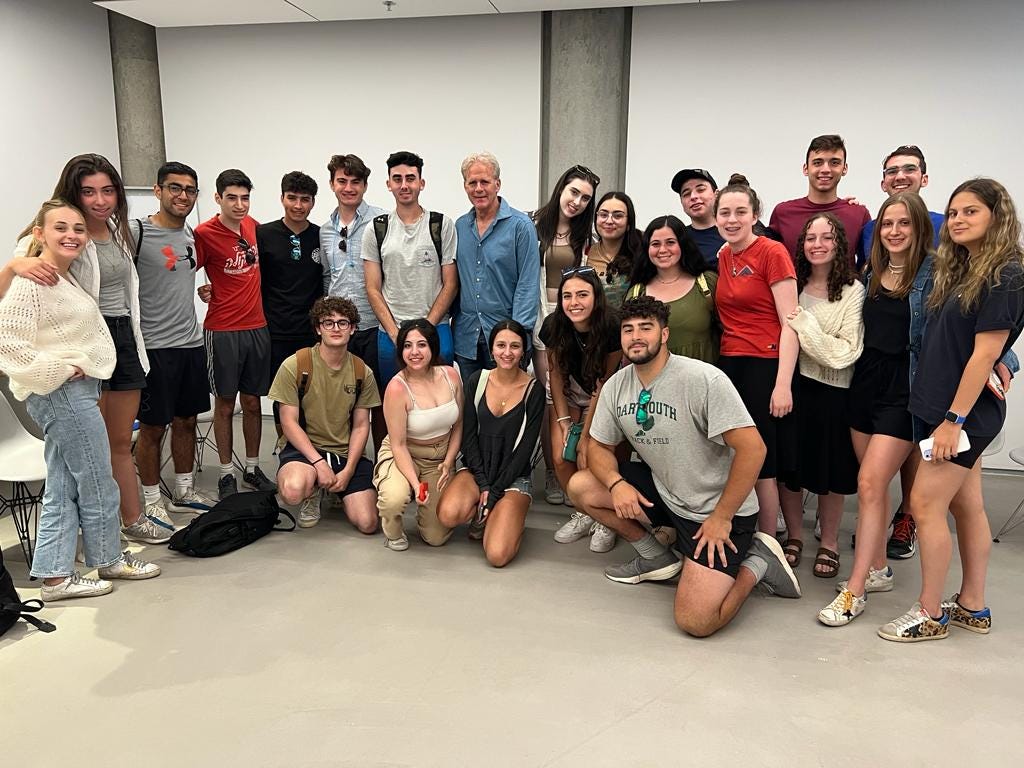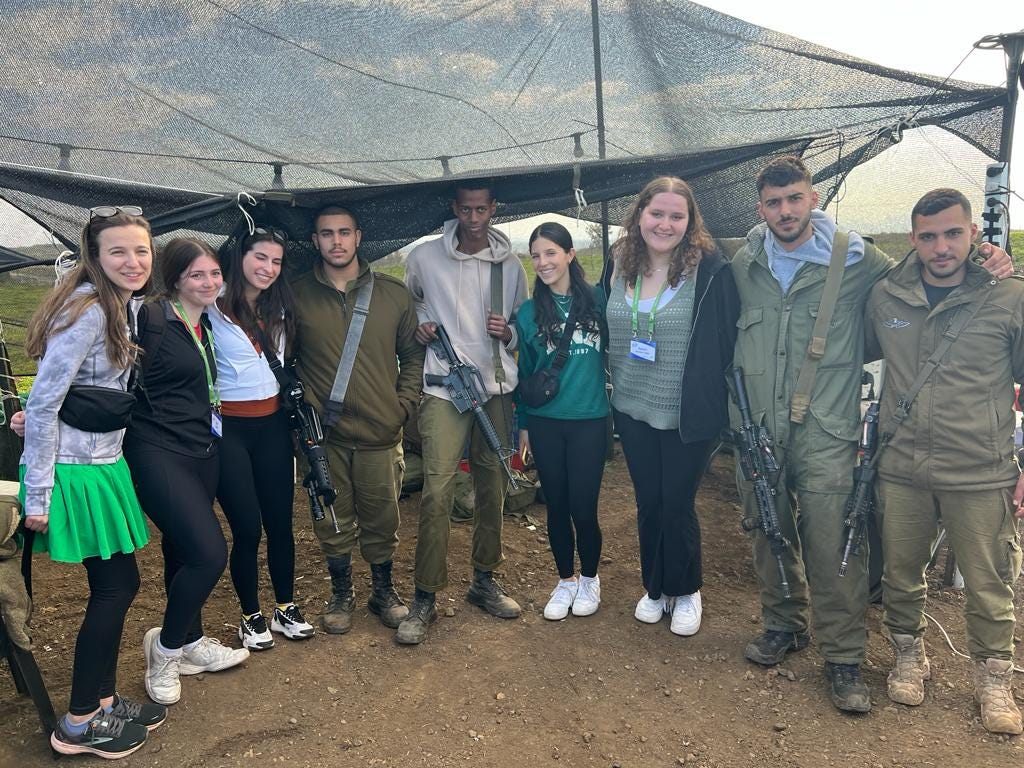Last ‘Write On For Israel’ Class Visits At Historic Moment
Focus of Jewish Week program evolved from advocacy to education over last two decades.
Face to Face: On a previous mission, Write On Students met with peers in an Israeli Arab school.
Thirty high school seniors from a range of public, private and Jewish day schools in the New York metropolitan area are visiting Israel this week as members of the 21st – and last – class of The Jewish Week’s Write On For Israel program.
They won’t be climbing Masada or floating on the Dead Sea. With almost two years of sessions on the history of Zionism and the reality of the Mideast conflict under their belts, they are being briefed by IDF officials overlooking the Syrian border, seeing the humanitarian efforts of Israeli doctors in treating children from around the world, meeting and interviewing government officials and Jewish and Arab journalists, and having discussions with Jewish and Israeli Arab teens their age. This week, especially, the students have the opportunity to deepen their understanding of how Israelis are grappling with the dilemmas facing the country at a critical moment in its history.
(The Jewish Week is closing out its Write On program after graduation this spring. Its founding director, Linda Scherzer, is continuing the work of preparing high school students for anti-Israel challenges on campus through the Teen Israel Leadership Council, sponsored by the Jewish Federation of Greater MetroWest NJ.)
Write On Class of ‘22 meeting in Israel with former Israeli Ambassador to the US Michael Oren (center).
This last Write On trip to Israel has prompted me to reflect on how the program came to be, how it evolved in its mission over two decades, and the impact it has had on its more than 800 alumni.
One of the benefits of the program is that it brings together a diverse group of young men and women who, coming from different denominational, social and educational backgrounds, likely would never have met otherwise. Experience and evaluations have shown that many students stay in touch not only with their Write On classmates but, once on campus, connect with previous Write On graduates who serve as unofficial mentors. And many students become involved with Israel-related activities, often taking on leadership positions early in their college careers. It’s very rewarding for me to meet Write On alumni, some in their mid-to-late 30s, who tell me how much the program, and the mission to Israel, has meant to them.
I share with you here a slightly revised version of the open letter I wrote to the students on Sunday, on the eve of their journey.
Dear Write On Students,
As a founder of Write On, now in its 21st year, I congratulate you on being part of the program, and wish you a successful trip. I promise it will be engaging and enlightening, and that you will come home not only knowing more about Israel’s triumphs and challenges, but about each other – with new and closer relationships formed during a week of bonding over this shared experience.
The Israel you will be visiting now is like no other Israel in its history. You have a unique opportunity to be there when, for the first time, the greatest threat to Israel’s security comes not from the outside — not from the Palestinians or the Arab countries or even Iran – but from within its own society.
Hundreds of thousands of Israelis have taken to the streets each Saturday night for the last seven weeks to protest the new government’s efforts to enact laws that would weaken Israel’s democracy. Leaders of all parts of Israeli society, including the president, have spoken publicly of their fear of civil war if a compromise is not reached very soon within the government.
You’ll be witnessing events and hearing from a variety of accomplished, thoughtful people representing the diversity of Israeli life. Take advantage of this special time. Don’t be afraid to ask questions, including hard questions – in a respectful manner.
How did Write On come to be, and how have its goals and mission evolved over the last two decades?
This program was launched during a time of another great threat to Israeli society. As you probably know, the Second Intifada was a horrific time of almost daily terrorist acts, mostly suicide bombings, by Palestinians against Israeli civilians – men, women and children – beginning in September 2000. It lasted almost five years and during that time, more than a thousand Israelis were killed. Israeli society’s move to the right politically began as a direct result of that time of great insecurity.
During the Intifada, Israelis began each morning wondering which family member or friend might be a victim that day. Hopes for a peace agreement with the Palestinians, which were sparked in the mid-1990s after the Oslo agreement, were dashed. Instead, there was a feeling of dread that led to a strong desire for security, a feeling that has only increased since then.
But much of the world reacted to the Intifada with less sympathy for innocent Israelis murdered than with Palestinian cries that Israel was an oppressor state. Campuses around the country became a second battleground – mostly through fiery rhetoric and student demonstrations – over the Israel-Palestinian conflict.
As editor and publisher of The Jewish Week at that time, I started speaking with Jewish college students about what was happening on their campuses. Most students expressed sympathy for Israel but acknowledged that they didn’t feel adequately prepared – emotionally or with the facts – to counter the anti-Israel protests.
I came to believe that in many ways it was too late to expect college students with little knowledge of such a complex Mideast history to become Zionists. It seemed best to prepare students in high school with the tools to be effective supporters of Israel when they got to campus.
Fortunately, my proposal to start a project that became Write On for Israel, educating students through the lens of journalism, was supported enthusiastically by the board of The Jewish Week, and by the Avi Chai Foundation, which fully funded the program for a number of years. (Avi Chai, which closed its charity a few years ago, made a huge impact with its support for Write On and many other important projects in the U.S. and Israel.) In recent years, the Paul E. Singer Foundation took on the role of major funder, and deserves our deepest gratitude.
I was also very lucky to meet Linda Scherzer, a talented journalist who had lived and reported from Israel for several years for CNN and Israeli TV and had a wonderful ability to communicate with people of all ages. When I explained my idea of Write On to her, she got it immediately, and she has been the director of the program from Day One. One of my great joys was working with Linda for almost 20 years. You are fortunate to have her as your leader.
In those early years of Write On, making the case for Israel in the American Jewish community was much easier than it is today. The facts were stark. Innocent Israelis were being blown up on buses going to school or work in Jerusalem and Tel Aviv and cities around the country. The great majority of diaspora Jews were fully supportive of their brothers and sisters in Israel.
In more recent years, though, a number of factors have contributed to a softening of American Jewish support, especially among younger people. As several major Mideast peace efforts failed and two Iranian-sponsored terrorist groups – Hamas in Gaza and Hezbollah in Lebanon – became more violently aggressive, Israelis grew more conservative. They were in no mood to initiate ambitious new peace overtures to the Palestinians.
At the same time, American Jews remained staunch liberals. For some, the divide between their Western values of equality, social justice, etc. clashed with their sentiment toward the land, history and people of Israel.
The BDS movement gained traction on U.S. campuses, where Israel was seen as a colonialist power. It became increasingly acceptable to criticize Israel. In addition, the concept of intersectionality took hold in recent years, resulting in pro-Israel Jewish students unwelcome in their efforts to support campus groups like Black Lives Matter or those in focusing on women’s or LGBTQ issues.
National and local Jewish organizations that sponsored trips to Israel for influential leaders — politicians, business people, clergy – changed their message from “Israel is a modern miracle” to “Israel is complicated.” And Write On, which focused more on “advocacy” in its early years, gradually came to emphasize “education,” encouraging students to learn the complex history of the Mideast and Modern Israel in forming their own views.
All of this is just part of the backdrop of Israel today, and an effort to explain the context for American Jewry’s relationship to the world’s only Jewish state. I hope this letter, and some of the issues it raises, can spark discussions among your group. And I would welcome hearing from any of you with your thoughts during or after your amazing week in Israel.
I urge you to take advantage of this unique experience. Think about what you can take away from it that will help you navigate the challenges you’ll soon face on campus. (And at the same time, have fun.)
Safe travels, and shalom,
Gary Rosenblatt







What a great program and how disappointing that the NY aspect of it has ended. It was a honor while employed at The Jewish Week to spend time working on Write On in any way I could.